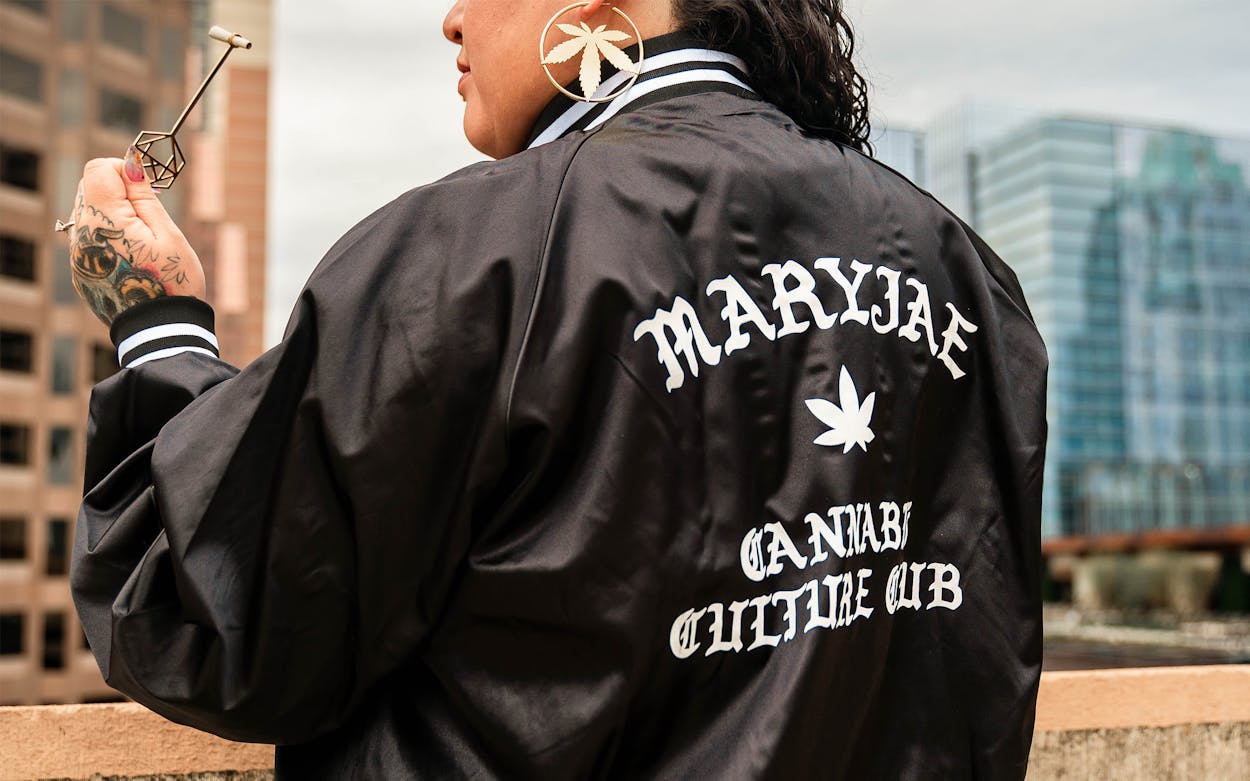Something strange happened when the smoke shop MaryJae, in Austin, posted a pink marijuana leaf in their storefront: longtime users and curious newbies reflexively walked toward it from down the block and across the street. “It’s like a Bat-Signal,” says Jae Graham, who co-owns the shop with her wife, Francisca Anciso. The new customer’s typical reaction upon entry to the shop, which looks like a high-end jewelry store designed by rainbow- pony-and-flower priestess Lisa Frank, is to scream. The second most popular reaction? “Oh my god oh my god oh my god is that glitter?”
Anyone who has driven past Texas strip malls the past few years has probably noticed “CBD” and “Hemp” signs blooming like spring bluebonnets. But while the stores are evolving to keep up with the increasingly sophisticated national trends, with brighter lights and fewer skull bongs, the marketing toward femme consumers is scant. Looking at a few women-owned smoke businesses, you might wonder why that’s the case.
Dallas businesswoman Molly Mathias has a name for the typical head-shop market: “the Rick and Morty guys.” It wasn’t a vibe that resonated with her; she saw herself as having more of a cowgirl spirit. So she opened two tiny brick-and-mortar shops called Go Easy in both Dallas and Houston in 2021 and produced a CBD-infused pecan pie chocolate bar. Then she created a spicy chocolate from CBD and Texas chiles. She carries different vendors of smoke products, as MaryJae does, and last year, she began selling her own line of CBD and delta-8 joints (including rose-infused, lavender-infused, and “sleepy cowgirl” pre-rolls), her own line of gummies, and a clear-glass, cloud-shaped pipe inspired by the beautiful drive she’d been taking between Houston and Dallas. She’d found the hole in the market: “I was meeting so many people—especially young women—who were like, ‘Oh my gosh, I’ve never had a place where I could feel comfortable buying this stuff. This stuff is never usually made for me.’ And so that kind of just like exploded,” she says.
Graham says that after opening MaryJae in 2017, it took her two years to understand that women were her target market—even those who were unaccustomed to her products. Her location, next to a nail salon, helped. One mother walked in with her daughters and started admiring “My Bud Vase,” which is a vase that can be used as a pipe, before her daughters started laughing. “They’re like, ‘Mom, it’s like a pipe.’ And she’s like, ‘No, it’s not.’ So I’m pulling it out and I’m showing them, ‘Yes, you smoke out of this but it is also a fashion piece,’ and they are just blown away. So this destigmatizes the cannabis industry. I love that. And that happens every day in our shop.”
Unlike Graham and Mathias, Katy Reddy, the Fort Worth owner and creator of Prettyhigh, only sells accessories through her website and a few select high-end stores—but she, too, noticed that a lot of the products available at the typical head shops didn’t fit her taste. “I’m really a fashion brand,” she says. “I joke you’ll never see me hitting out of a big bong, getting hammered, or upside down on a keg. It’s not the way I choose to consume. I’d like it to be more sophisticated. Little bits and little hits.” In 2016, she began designing and producing a line of luxury paraphernalia, such as “Doug,” a $350 brass-accented, black Lucite dugout—a tiny box that features a storage compartment and a pipe the size of a cigarette—with a birchwood-lined herb pocket and a titanium pipe. Because she makes her work in small batches and not the hundred-item batches often required of a wholesaler, she set up a website and watched the sales come in.
Not everyone predicted these businesses would survive in Texas. “The very first year we were open in 2017,” says Graham, “we had many men come in and kind of laugh at the pink stuff that we had. And they were like, ‘Good luck selling this.’ ” Mathias’s experience was a little better. “When I meet with the Rick and Morty guys, they’re like, ‘We want to sell to those [female] customers, but we just don’t know how.’ They see our products and they’re like, ‘I don’t get it, but I know that other people get it.’”
Even with ready customers and legal strains of low-THC plants and gummies available since 2019, the weed business is hardly easy. All complained that the stigma and the laws have created a rocky path. “I had several meetings with one design firm who, after the project crossed the owner’s desk, denied the project and said they would no longer be working on the logo,” says Reddy. Customs agents will sometimes make an example of a wholesaler and destroy paraphernalia, as they did last year to a shipment of pipes Mathias had been expecting.
Graham says she’s often on edge. “The state laws can change within days,” she says. There was a period in 2021, for example, when stores were selling hemp products with less than 0.3 percent THC, as permitted by Texas law, but some regulators came out and said delta-8 was not permitted, leading to a temporary ban before a judge allowed it back on shelves.
Of course, their lives would be easier if they took their businesses to Colorado or California, where cannabis is legal—as all their friends frequently remind them. But partly out of loyalty to their community and partly due to a kind of wildcatter spirit, they’re staying for now, and waiting. “We’re a huge state,” says Mathias. To her thinking, success is a matter of time and straight-up population numbers—half of whom are female. “One day, when Texas does go legal,” she says, “we will instantly become the biggest cannabis state in the country.” She’ll be ready.
- More About:
- Style & Design
- Marijuana
- Fort Worth
- Dallas
- Austin








